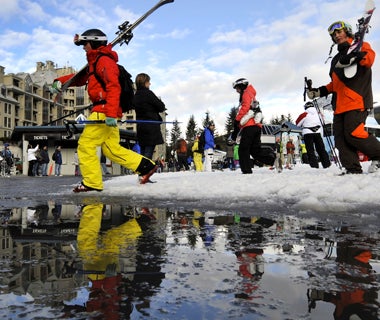
Can the Winter Olympics survive climate change?
Most cities that have hosted the Winter Olympics will be too warm to host the Games of the future, a University of Waterloo study finds

Most cities that have hosted the Winter Olympics will be too warm to host the Games of the future, a University of Waterloo study finds
By Staff Marketing and Strategic CommunicationsOnly six of the previous Winter Olympics host cities will be cold enough to reliably host the Games by the end of this century if global warming projections prove accurate, a new Waterloo study has found.
 Even with conservative climate projections, only 11 of the previous 19 sites could host the Games in the coming decades, according to the study conducted by the University of Waterloo and the Management Center Innsbruck in Austria.
Even with conservative climate projections, only 11 of the previous 19 sites could host the Games in the coming decades, according to the study conducted by the University of Waterloo and the Management Center Innsbruck in Austria.
“The cultural legacy of the world’s celebration of winter sport is increasingly at risk,” said lead author Daniel Scott, an associate professor in Waterloo’s Faculty of Environment and a Canada Research Chair in Global Tourism. “Fewer and fewer traditional winter sports regions will be able to host an Olympic Winter Games in a warmer world.”
Average February temps have increased at host cities
The average February daytime temperature of Winter Games locations has steadily increased – from 0.4°C at Games held in the 1920-50s, to 3.1°C in Games during the 1960-90s, and 7.8°C in Games held in the 21st century.
The study finds that internationally renowned Olympic sites like Vancouver, Squaw Valley, USA, Garmisch-Partenkirchen, Germany, and Sochi, Russia will no longer have climates suitable to reliably host the Games by the middle of the 21st century. With additional warming projected for later decades of this century, as few as six former host locations would be suitable.
"This report clearly points out the challenges that lie ahead for the Olympics because of climate change,” said Chris Steinkamp, executive director of Protect Our Winters. “It's particularly powerful to see how past Olympic host cities could be impacted under a higher emission scenario, so hopefully this will serve as a wake up call to the IOC and world leaders that major commitments to carbon reductions need to be made."
“Today it would be difficult to imagine successfully delivering the diverse Games program exclusively on natural ice and snow, as it was in the early decades of the Olympic Winter Games,” said Dr. Robert Steiger of the Management Center Innsbruck.
Weather risk management will become even more important in the coming decades with average February temperatures in past Winter Olympic host locations expected to warm an additional 1.9 to 2.1°C by mid-century and 2.7 to 4.4°C in late century.
There are limits to snowmaking
The study also examines how technological advancements and strategies developed over several decades have been used to manage weather risk at the Winter Olympics. Technology like snowmaking, track/jump refrigeration and high-resolution weather forecasting are now critical components of staging a successful Winter Games.
“Despite technological advances, there are limits to what current weather risk management strategies can cope with,” said Scott. “By the middle of this century, these limits will be surpassed in some former Winter Olympic host regions.”

(GettyImages/ Rosella De Berti)
Read more
Study reveals changes International Olympic and Paralympic Committees could implement to keep Games viable and safer for athletes

Read more
An ambitious research collaboration with Habitat for Humanity is reimagining home ownership across Waterloo Region and Canada

Read more
Here are the people and events behind some of this year’s most compelling Waterloo stories
The University of Waterloo acknowledges that much of our work takes place on the traditional territory of the Neutral, Anishinaabeg, and Haudenosaunee peoples. Our main campus is situated on the Haldimand Tract, the land granted to the Six Nations that includes six miles on each side of the Grand River. Our active work toward reconciliation takes place across our campuses through research, learning, teaching, and community building, and is co-ordinated within the Office of Indigenous Relations.